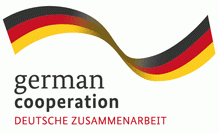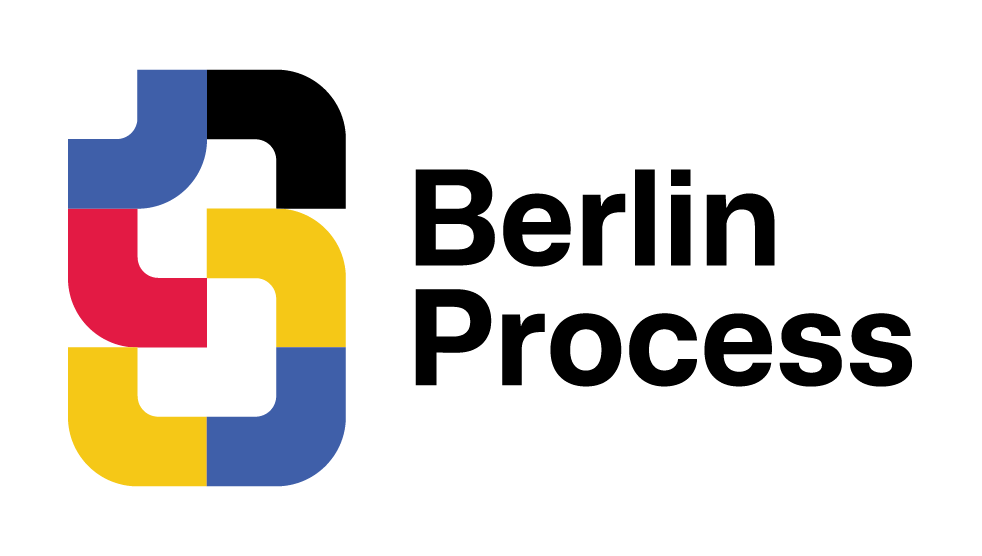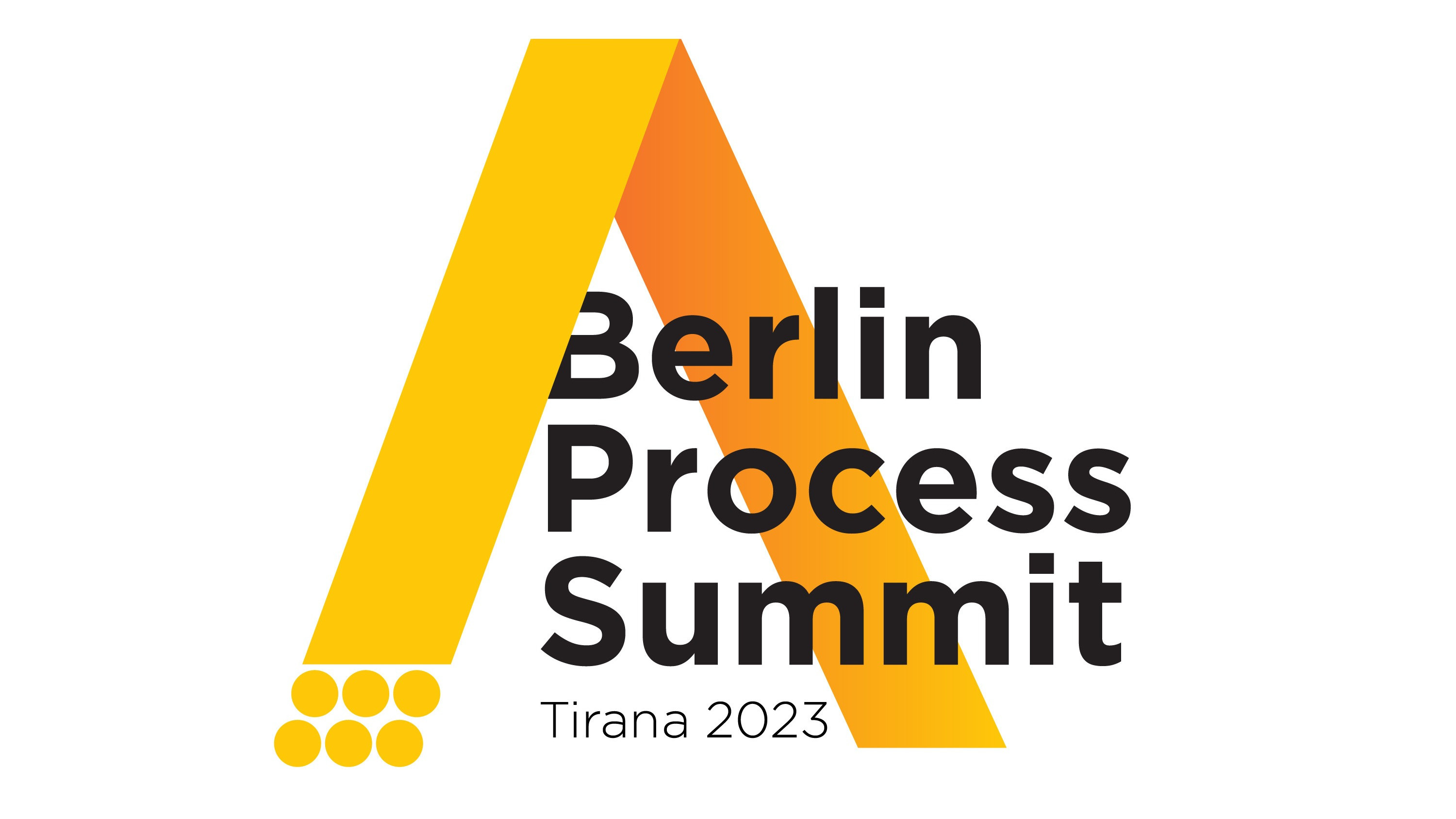Progress in regional cooperation and ongoing challenges were assessed, building on previous Ministerial Meetings. The Western Balkans Six (WB6) welcomed a Growth Plan and committed to advancing regional economic integration through the Common Regional Market, underlining the importance of domestic reforms and organized crime combat.
A collaborative spirit marked discussions on bridging the socio-economic gap between the Western Balkans and the EU. Participants showed interest in fostering cooperation in various policy areas, aiming to enhance regional economic convergence. Several agreements and pacts were celebrated, including the Agreement on Mutual Recognition of Professional Qualifications and reduced data roaming charges between the EU and the Western Balkans.
Youth, education, and research were pivotal topics. The establishment of the College of Europe campus in Tirana was lauded as a significant step towards fostering EU affairs expertise across the region. The need for increased investments in research and innovation was underscored, alongside recommendations for establishing Research and Technology Excellence Hubs.
The summit also discussed the potential Value Chain Partnership between the EU and the Western Balkans, considering the region’s strategic importance in the context of Critical Raw Materials and batteries. This partnership aims to prioritize investments in research, innovation, and sustainable mining practices.
In trade, transport, and digital connectivity, the need for boosting investments in transport infrastructure was a focal point. The participants supported various declarations aimed at enhancing connectivity and called for increased efforts towards trade facilitation.
Environmental consciousness permeated discussions, with the Green Agenda for the Western Balkans being a focal point. Leaders endorsed the Joint Declaration of Intent on the Regional Climate Partnership, underscoring the necessity for a green transition and private sector investments in energy efficiency, renewables, and sustainable development.
Security issues were also highlighted, with an emphasis on deeper regional cooperation and enhanced information sharing to tackle organized crime and strengthen cybersecurity. The establishment of the Western Balkans Cyber Capacity Centre marked a significant milestone.
Tensions between Serbia and Kosovo were acknowledged, with a collective call for dialogue and reconciliation. The participants highlighted the importance of good neighbourly relations and regional cooperation for EU integration.
The Roma integration was applauded, with the adoption of conclusions from the Fourth Roma Ministerial outlining steps for implementation in education, employment, digital field, and civil registration.
Looking ahead, Germany’s willingness to host the next Leaders’ Summit in 2024 was welcomed, marking the 10th anniversary of the Berlin Process, symbolizing the ongoing commitment to regional cooperation and integration into the EU framework.
| Document | View |
|---|---|
| Joint Declaration of Intent: Regional Climate Partnership Summit 2023 | View |
| Agreement: Recognition Of Professional Qualifications of Nurses, Veterinary Surgeons, Pharmacists, and Midwives | View |
| Joint Declaration: Single Euro Payments Area Summit 2023 | View |
| Joint Declaration: Facilitation of Trade and Transport | Berlin Process Summit | View |
| Joint Statement: Preventing Plastic Pollution Including Marine Litter Summit 2023 | View |
| Joint Declaration: WiFi4EU for Western Balkan Summit 2023 | View |
| Joint Declaration: Establishment of a Convergence Observatory in the Western Balkans Summit 2023 | View |
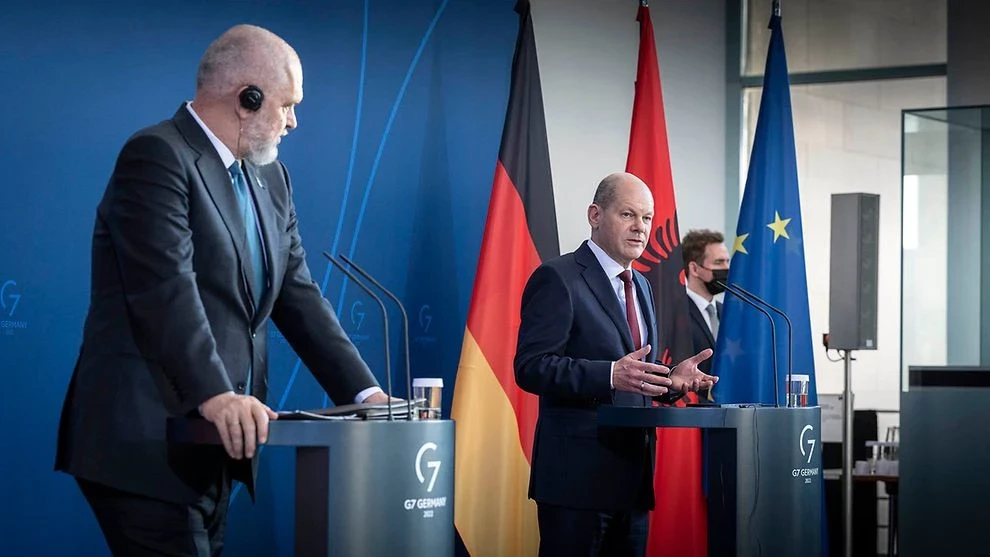 In the press conference of Chancellor Scholz and Prime Minister Rama on the visit of the Prime Minister of the Republic of Albania on March 7, 2023, in Berlin, Scholz speaks not only of the achievements of the region in the previous year but also of the anticipated Berlin Process Summit. This summit took place on October 16, 2023, in Tirana, Albania. You can find the entire speech on the German government's website here (German only).
In the press conference of Chancellor Scholz and Prime Minister Rama on the visit of the Prime Minister of the Republic of Albania on March 7, 2023, in Berlin, Scholz speaks not only of the achievements of the region in the previous year but also of the anticipated Berlin Process Summit. This summit took place on October 16, 2023, in Tirana, Albania. You can find the entire speech on the German government's website here (German only).
Picture: German Government
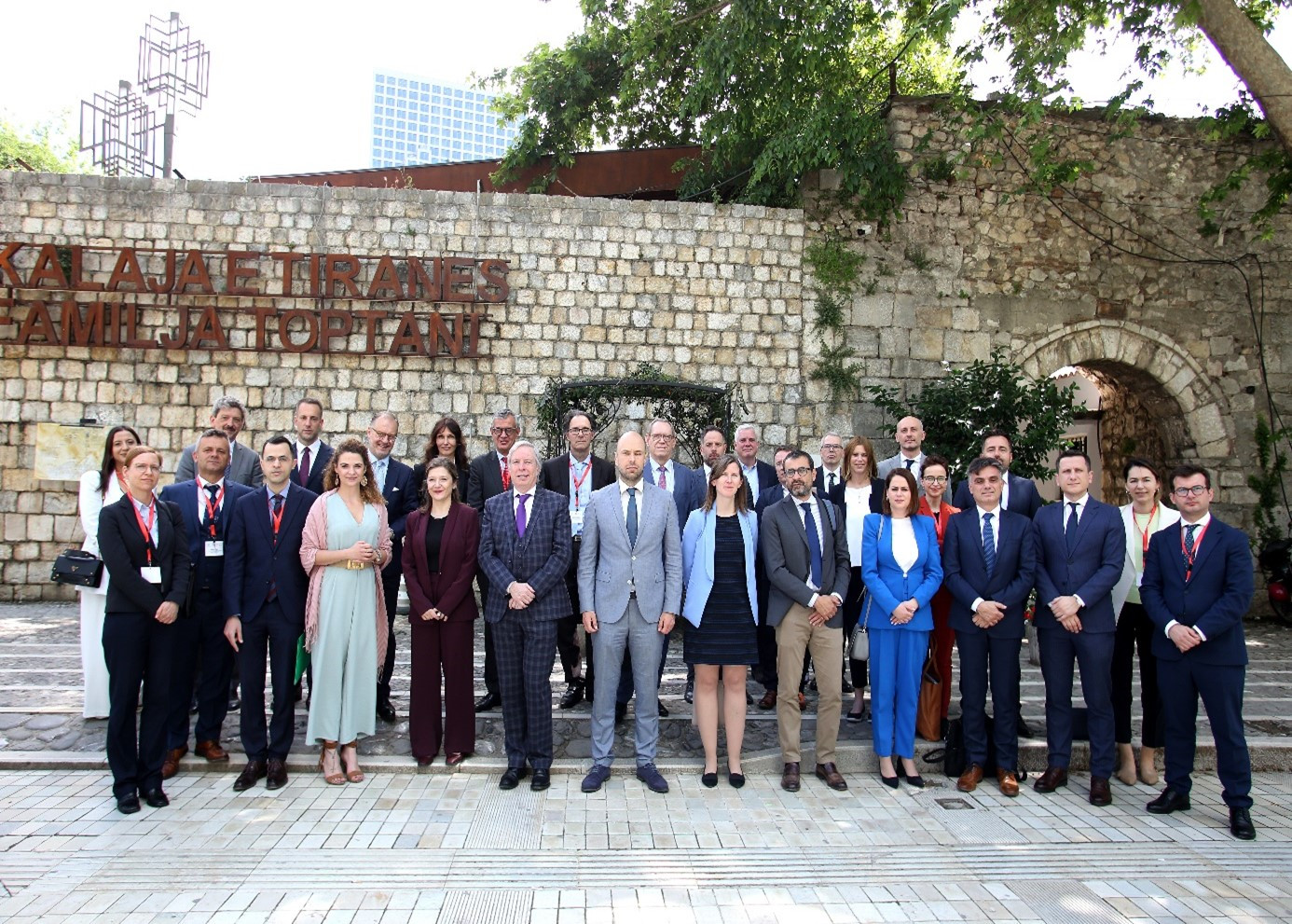
Representatives from Western Balkans Ministries of Foreign Affairs, EU Member States, and international organizations convened in Tirana on May 19 for a Berlin Process Coordination Meeting. This session set the stage for the upcoming Berlin Process Summit scheduled for October 16, 2023 in Tirana. The aim was to assess progress since the 2022 Summit and discuss activities and steps for the 2023 Summit preparations.
Key Highlights were:
1. Addressing Regional Priorities: The Albanian Chairmanship for 2023 outlined key priorities for advancing Western Balkans cooperation and development. These encompassed connectivity, digital integration, energy security, and youth engagement. These initiatives are expected to foster regional ties, enhance infrastructure, and promote economic growth.
2. Common Regional Market (CRM): Participants acknowledged the significance of economic integration for the region's progression. They welcomed the technical negotiations on the Agreement for Recognition of Professional Qualifications for healthcare professionals and expressed commitment to tasks within the CRM framework.
3. Youth and Mobility: Prioritizing youth involvement, the participants supported mobility agreements and negotiations for access to higher education. The roaming agreement, a result of the Berlin Process, was highlighted for its role in improving connectivity among citizens.
4. Connectivity and Integration: The meeting emphasized transport and digital connectivity within the region and with the EU. Steps included implementing the Green Lanes initiative for efficient border crossings and reducing data roaming charges. Strengthening cybersecurity and energy sector measures were also emphasized.
5. Research and Education: The Albanian Chairmanship aimed to enhance research infrastructure, align economies in research mechanisms, and foster education engagement. Prioritizing trade, strengthening links to the internal market, and sustainable green financing were also key focuses.
6. Private Sector and European Agencies: Acknowledging the private sector's role, the integration of businesses into priority-setting was endorsed. Identification of European agencies for the region's participation was highlighted.
7. Towards the 2023 Summit: The meeting concluded with a shared vision for the upcoming Berlin Process Summit, reaffirming the commitment to regional integration and development, fostering economic resilience, and achieving shared success.
This gathering underscored the dedication of Western Balkans and EU stakeholders to enhancing collaboration, infrastructure, and economic growth, marking a significant step towards the upcoming Berlin Process Summit.
Please find the full report under Documents.
Picture: GIZ
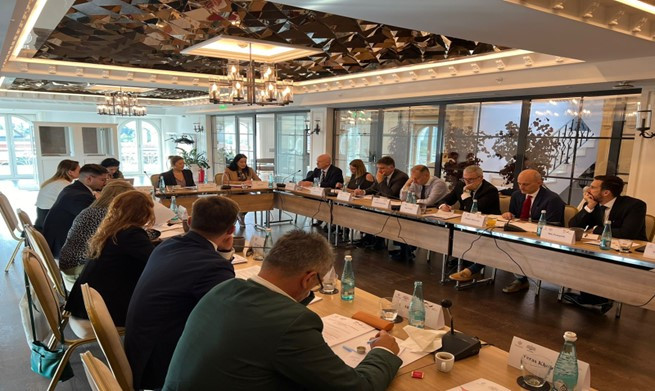
On September 29, 2023, Tirana hosted the coordination meeting of the Western Balkan 6 Ministries of Foreign Affairs (WB6 MFAs) under the Berlin Process. This gathering included representatives from key regional and international bodies, both in person and virtually.
The core objective was to discuss policy topics and interventions relevant to the upcoming Ministerial Meeting of Foreign Affairs and to provide an update on the agreements scheduled for signing at the Berlin Process Summit 2023. Proposals introduced spanned across the establishment of a regional cybersecurity unit, bolstering the integration into the digital domain within the single market, and policy strides toward reducing roaming fees.
Significant progress was noted in the Mutual Recognition of Professions (MRA 2.0), and a joint statement on the Climate and Energy Partnership illustrated political and financial commitments from the German government. During the meeting, several policy issues were brought to the forefront of discussions, potentially serving as initiatives within the framework of Summit 2023. These include 1. The establishment of a modern payment system aimed at boosting the digital economy. 2. The anticipated collaboration among countries in the trade and transport facility program and 3. Deliberation and agreement on the WB WI-FI initiative as a vital component of the digital agenda, with the expectation of signing a memorandum of understanding with the Western Balkans (WB) to strengthen the digital agenda.
Additional discussions included the initiation of a convergence observatory with the OECD to tackle data-related convergence issues and the implementation of mobility agreements. Completed technical level agreements highlighted included recognizing authorized economic operators and professional qualifications, e-commerce decisions, and initiating a veterinary working group.
The meeting reaffirmed the EU’s steadfast commitment to the Western Balkans, underscoring the Berlin Process's pivotal role in supporting the region’s EU integration aspirations. The dialogue spotlighted economic convergence with neighboring EU member states and accelerating integration within the internal market as core discussion points for the upcoming Summit 2023.
As preparations for the Ministerial Meeting of Foreign Affairs continue, the developments and dialogues under the Berlin Process emphasize the importance of enhanced regional cooperation, security, and economic integration. These ongoing efforts are a testament to the collective journey towards a unified and prosperous European continent.
Please find the report in Documents
In 2023 the Berlin Process Summit was accompanied by a number of meetings and events, as follows:
6. - 7.6. Berlin Process Preparatory Meeting „Climate Partnerships”
12.-13.9. Conference “Enhancing Berlin Process through Parliamentary Diplomacy”
14.9. Meeting of Ministers of Interior
18.-20.9. Science Conference
26.9. Meeting of Ministers of Economy
26.9. Business Forum
26.9. Conference of the European Climate Initiative
6.10. Meeting of Foreign Ministers
6. - 7.10. Youth Forum
13.10. Meeting of the Chairs of EU Committee of the WB Parliaments
14.-15.10. Civil Society and Think Tank Forum (CSF)
16.10. Berlin Process Summit
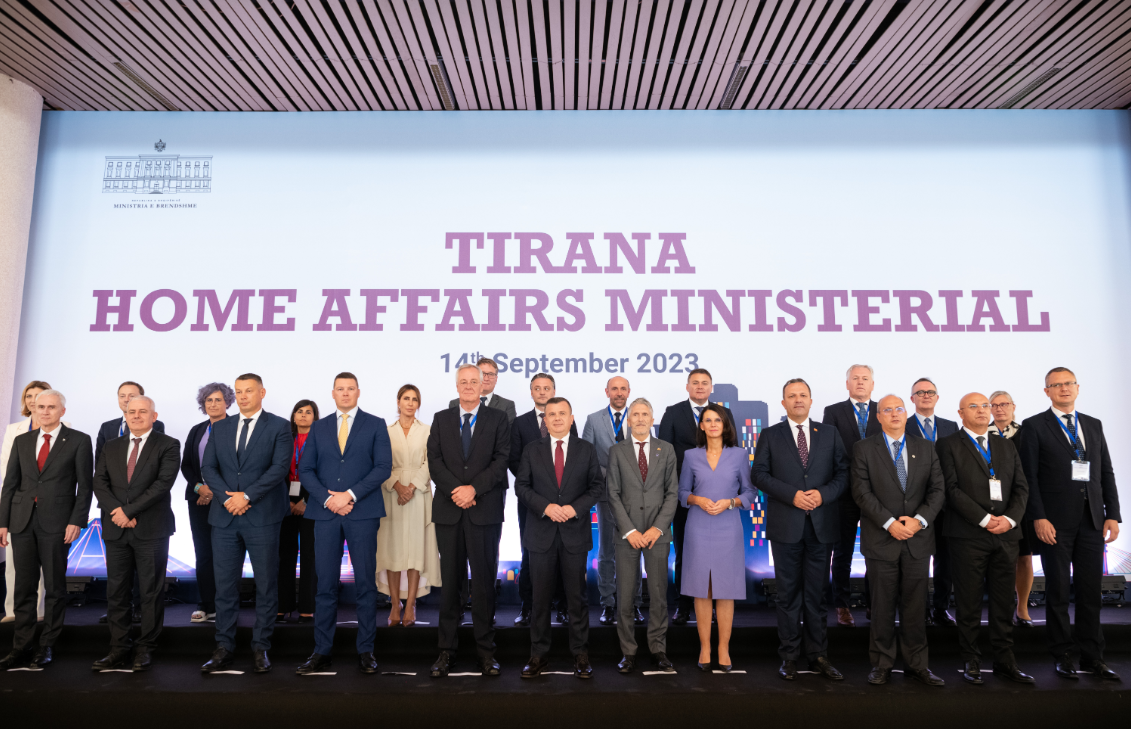
On September 14, 2023, the Tirana Home Affairs Ministerial convened, marking a significant stride towards enhanced security and cooperation among the Western Balkan nations within the framework of the Berlin Process. Hosted by Albania’s Minister of Interior, Mr. Taulant Balla, the assembly accentuated key areas, including the fortification of integrated border management and the staunch fight against transnational organized crime and cyber threats.
The Ministers unanimously advocated for the advancement of integrated border management. European Union support was spotlighted as crucial, with capacity building, digitalization, and enhanced border security emerging as focal areas to proficiently tackle migration and border-crossing crimes. The EU-Action Plan on Western Balkans was upheld as a core reference, with a call for extended European partnerships in establishing comprehensive systems for information exchange, joint actions, and risk analysis.
Transnational organized crime was another central theme, with the ministers resolute in countering its deleterious impact on public safety, social cohesion, and democratic institutions. The crimes, recognized for their cross-border nature, necessitate amplified cooperation not only within the Western Balkans but also with the EU and international entities. The envisioned path forward includes the formation of Joint Task Forces and enhanced interagency cooperation, encapsulating law enforcement, prosecution, and judiciary to effectively counter human trafficking, smuggling, and drug trafficking.
In the realm of cybersecurity, the need for reinforced international and regional collaboration was underscored. Western Balkan countries explicitly expressed the intent to integrate into the CSIRT network under the NIS 2 Directive. The establishment of a coordinated platform for early warnings, shared practices, and technical support was pinpointed as vital. The dialogue underscored the urgency for financial backing and expert training to augment the region’s resilience and responsive capacity to evolving cyber threats.
The meeting culminated in a collective call for the harmonization of national cybersecurity frameworks. Standardized policing and approaches across nations were identified as pivotal to safeguarding critical infrastructure, notably susceptible to cyber-attacks. This comprehensive overview offers a snapshot of the key discussions and conclusions of the Tirana Home Affairs Ministerial 2023. For an in-depth insight, the full report is accessible, unfolding detailed deliberations and strategic outcomes of this essential gathering.
Picture: Armand Habazaj; rcc.int
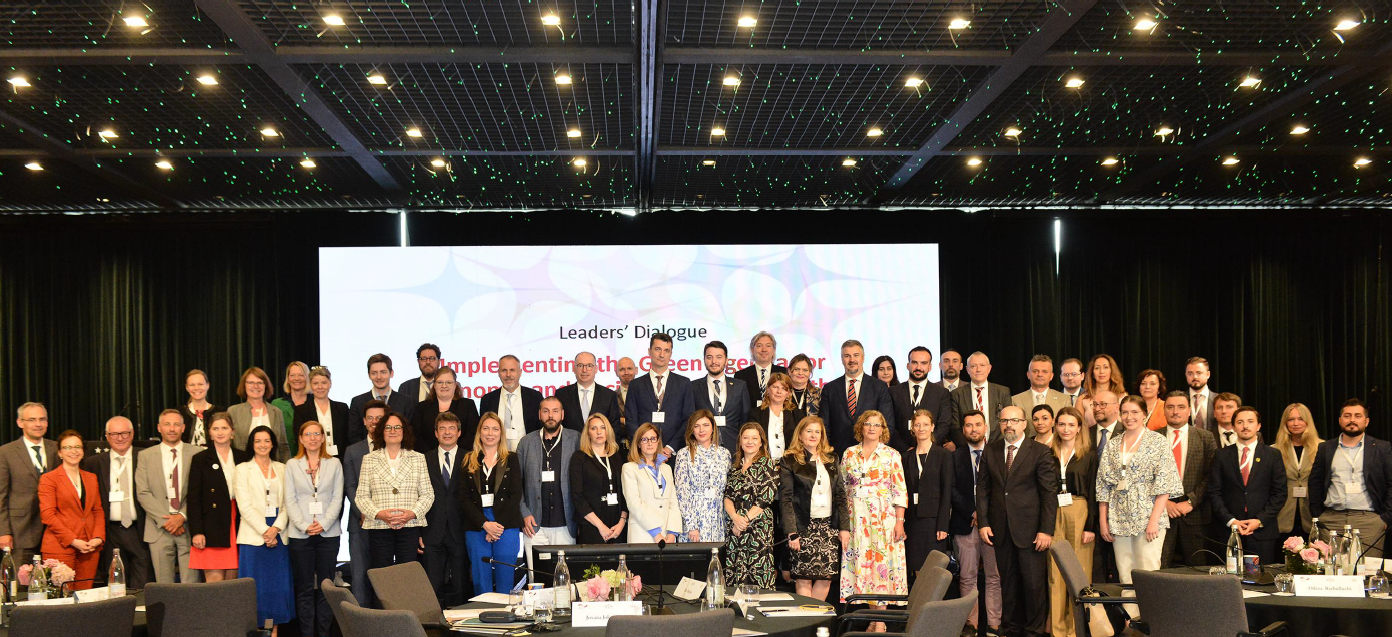 The Leaders' Dialogue conference, held in Tirana on June 7, 2023, united representatives from Western Balkan and German governments, European Commission, regional bodies, international donors, and civil society organizations to advance the Green Agenda for economic and societal prosperity. The conference acted as a precursor to the Berlin Process Summit and underscored the collective commitment to environmental and climate goals.
The Leaders' Dialogue conference, held in Tirana on June 7, 2023, united representatives from Western Balkan and German governments, European Commission, regional bodies, international donors, and civil society organizations to advance the Green Agenda for economic and societal prosperity. The conference acted as a precursor to the Berlin Process Summit and underscored the collective commitment to environmental and climate goals.
During the conference, participants engaged in discussions highlighting the importance of EU integration and the Berlin Process in enhancing the Green Agenda. Economic and societal prosperity were closely linked with the effective implementation of this Agenda, and the need for multilateral cooperation was emphasized. EU’s partnership and increased funding were highlighted, aiming for a broader engagement of the Western Balkans in EU climate instruments. The necessity for public awareness and education regarding the Green Agenda and the accompanying financial implications was a focal point of the discussion.
Themes of government-private sector-civil society collaborations emerged prominently. Effective Green Agenda implementation necessitated enhanced governance frameworks and active involvement of local and regional authorities. The role of civil society in monitoring and implementing the Green Agenda was emphasized, indicating a need for a structured dialogue among governments, business communities, and civil society.
Socio-ecological transformation underscored the role of green and digital transitions in economic development and EU integration. Challenges posed by climate change and environmental degradation in the Western Balkans required substantial adjustments in policies and societal behaviors. The digital economy’s integration with the EU Digital Single Market was seen as pivotal for economic revitalization. Emphasis was placed on supporting SMEs and start-ups, and addressing the agricultural sector’s sustainability challenges.
The discussions also covered the need for decarbonization and investment in renewables. Private and public sector partnership was deemed essential for expanding renewable energy and electrifying the transport system. Regional cooperation was highlighted for maximizing funding and resources to enhance energy efficiency and reduce pollutant emissions. The role of initiatives like the Initiative for coal regions in transition was acknowledged for supporting green growth processes.
Lastly, the conference lauded the Regional Climate Partnership between Germany and the Western Balkans. It was seen as a platform for high-level policy dialogues and regional cooperation, supporting the Green Agenda’s objectives. The partnership aims to facilitate EU integration by aligning the region with EU climate and sustainability goals and is backed by financial and technical cooperation, including a EUR 1.5 billion commitment announced at the 2022 Berlin Process Summit. Participants expressed the need for more such meetings to foster exchange and collaboration for a green and socially just transition.
Please find the full report in documents.
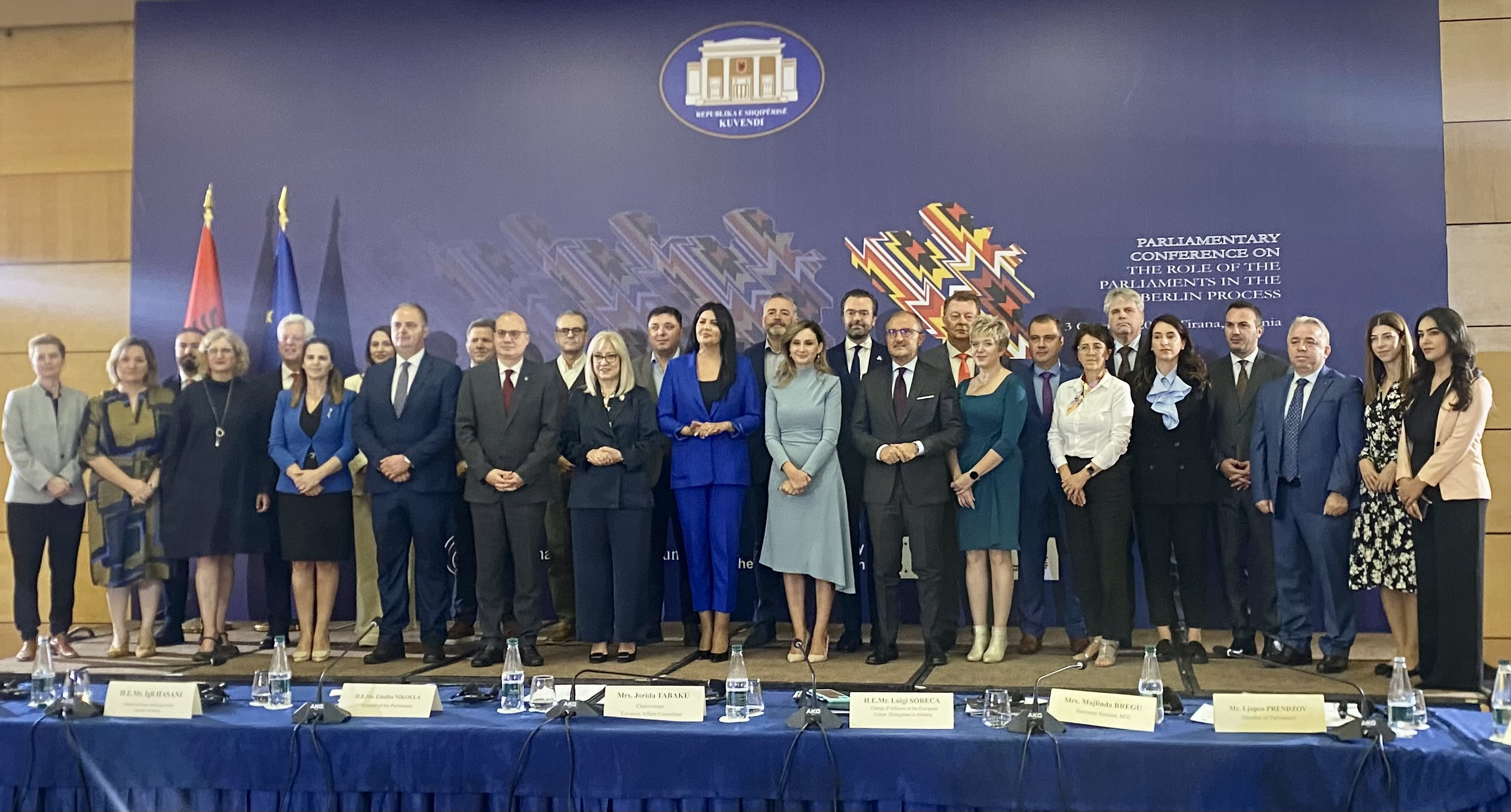
Photo: Deborah Leuthold
On October 13, the "Role of the Parliaments in the Berlin Process" conference took place in Tirana, Albania gathering Members of the Western Balkans Parliaments, parliamentary staff, and other relevant stakeholders. Building on a previous conference held in Skopje in September 2023, this event focused on enhancing parliamentary engagement and decision-making in the Berlin Process. A joint Declaration, underscoring the vital role of parliaments in the Berlin Process, was agreed upon, emphasizing regional cooperation in the Western Balkans. The overarching aim is to instill a deeper sense of ownership and involvement of the Parliaments in promoting the objectives of the Berlin Process and in monitoring the commitments made by the governments, particularly within the Common Regional Market (CRM).
The discussions highlighted the integral role of regional collaboration in progressing towards EU integration. The importance of the Berlin Process as a platform for reform and regional cooperation was emphasized, spotlighting the need for parliaments' support through adopting legislation and providing strategic direction.
Moreover, the role of parliaments in regional cooperation was discussed, emphasizing the need for more practical involvement and central positioning in the Berlin Process. The relationship between parliaments and civil society was also explored, underscoring mutual benefits and the significant contributions each sector brings to the discussions.
The conference was organized in collaboration of the Committee on European Affairs of the National Parliament of Albania and the project “Parliamentary Diplomacy: Regional Cooperation through Enhanced Parliamentary Dialogue” which is implemented by a Consortium of civil society organizations from the Western Balkans led by the Institute for Democracy and supported by the Federal Foreign Office of Germany. This conference, as well as the first one held in Skopje, was also supported by Deutsche Gesellschaft für Internationale Zusammenarbeit (GIZ) GmbH, on behalf of the German Federal Ministry for Economic Cooperation and Development (BMZ).On October 13, the "Role of the Parliaments in the Berlin Process" conference took place in Tirana, Albania gathering Members of the Western Balkans Parliaments, parliamentary staff, and other relevant stakeholders. Building on a previous conference held in Skopje in September 2023, this event focused on enhancing parliamentary engagement and decision-making in the Berlin Process. A joint Declaration, underscoring the vital role of parliaments in the Berlin Process, was agreed upon, emphasizing regional cooperation in the Western Balkans. The overarching aim is to instill a deeper sense of ownership and involvement of the Parliaments in promoting the objectives of the Berlin Process and in monitoring the commitments made by the governments, particularly within the Common Regional Market (CRM).
The discussions highlighted the integral role of regional collaboration in progressing towards EU integration. The importance of the Berlin Process as a platform for reform and regional cooperation was emphasized, spotlighting the need for parliaments' support through adopting legislation and providing strategic direction.
Moreover, the role of parliaments in regional cooperation was discussed, emphasizing the need for more practical involvement and central positioning in the Berlin Process. The relationship between parliaments and civil society was also explored, underscoring mutual benefits and the significant contributions each sector brings to the discussions.
The conference was organized in collaboration of the Committee on European Affairs of the National Parliament of Albania and the project “Parliamentary Diplomacy: Regional Cooperation through Enhanced Parliamentary Dialogue” which is implemented by a Consortium of civil society organizations from the Western Balkans led by the Institute for Democracy and supported by the Federal Foreign Office of Germany. This conference, as well as the first one held in Skopje, was also supported by Deutsche Gesellschaft für Internationale Zusammenarbeit (GIZ) GmbH, on behalf of the German Federal Ministry for Economic Cooperation and Development (BMZ).
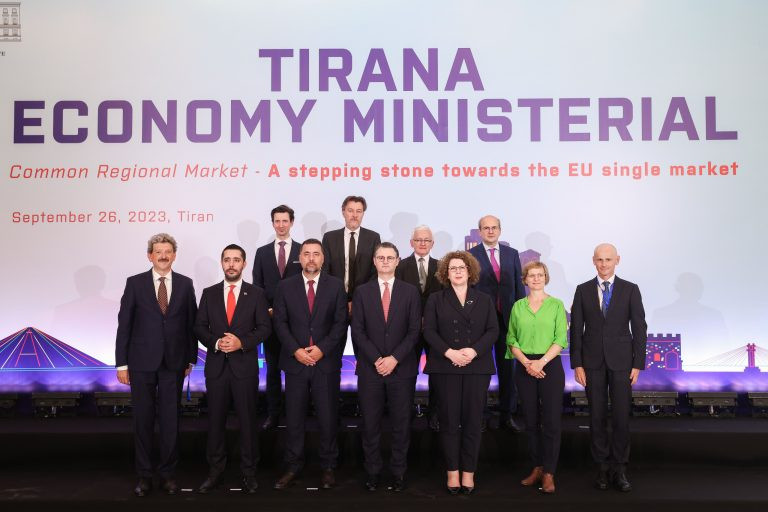
The Berlin Process Forum of Economy Ministers convened in Tirana on September 26th, 2023, to deliberate the progression of the Common Regional Market (CRM) as a pathway towards integrating with the EU Single Market. Discussions revolved around the strides made, focal points, and hurdles faced while executing the Action Plan for CRM under Albania's guidance of the Berlin Process.
The alignment of Western Balkans with the EU Single Market has been significantly bolstered through various trade accords, pushing for further integration. Economic synchronization is viewed as a shared advantage for both the region and the EU. Expansion into individual EU programs and initiatives, accentuating trade in goods, e-commerce, and sustainable value chains, is a prospective advancement.
The forum acknowledged the EU's integration efforts and accentuated the necessity for enhanced regional connectivity and infrastructure upgrades. A roadmap is in the works to advance EU-Western Balkans border management and trade facilitation, with an emphasis on the integration of SMEs into multinational supply chains and regional partnerships.
Efforts to bolster youth employability and economic upswing through the Regional Challenge Fund were lauded. The ministers underscored the prospective impact of the EU’s New Growth Plan for the Western Balkans, envisioning strengthened collaborations in digital transformation and green initiatives. Several initiatives embedded in the Growth Plan, including the integration into the European Raw Materials Alliance and enhancing regional entrepreneurs’ readiness for the Single Market, were spotlighted.
The ministers reemphasized the significance of the CRM Action Plan, a blueprint inspired by the EU’s four freedoms – the movement of goods, services, people, and capital. The accomplishments to date, including the signing of a roaming agreement and establishment of Green Corridors, have enhanced regional economic integration. The need for swift adoption and implementation of arrangements agreed under the CEFTA framework was underscored.
Payment systems' integration is deemed essential for market functionality, and SEPA membership is viewed as a pivotal step for the Western Balkans. The ministers expressed unanimous support for prioritizing actions aimed at fulfilling SEPA requirements, which would facilitate instant payments and bolster the FinTech industry in the region.
The annex outlined commitments across various sectors, including trade, goods and services movement, capital, people, regional investment, digital area, innovation, industrial area, and sustainable tourism. These commitments are envisioned to accelerate regional cooperation and EU integration, underscoring the strategic alignment of economic and infrastructural initiatives with EU standards and policies.
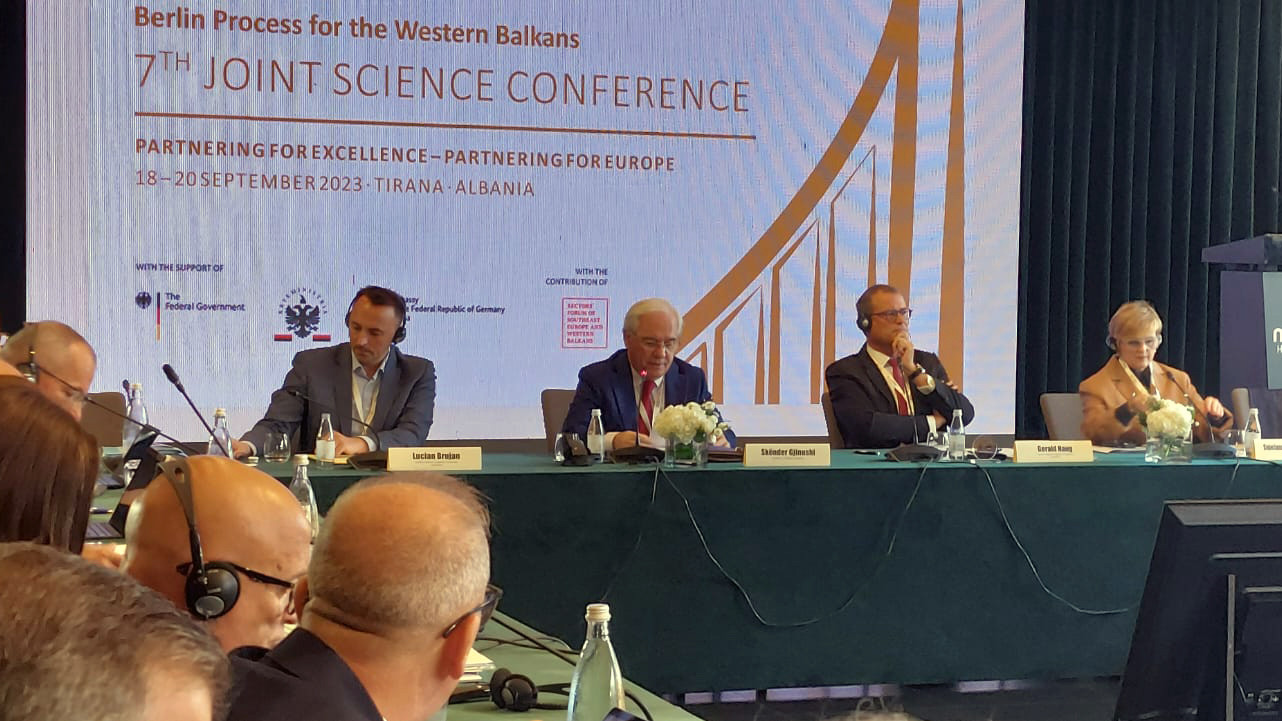
Photo: Academy of Sciences of Albania
The 7th Berlin Process Joint Science Conference held in Tirana from September 18-20, 2023, focused on the transformation and strategic development of higher education, research, innovation, and technology sectors in the Western Balkans and Southeast Europe. The emphasis was laid on excellence, mobility, cooperation, and knowledge-driven growth. Key messages included the necessity of investments in education and innovation to combat brain drain and expedite EU integration.
Several priority actions were recommended:
- Stable Funding: Allocating a minimum of 4% of national GDP to education and 2% to research and innovation by Western Balkan governments, aiming to increase these thresholds progressively.
- EU’s Growth Plan: Incorporation of targeted investments in education, research, and innovation into the EU’s new Growth Plan for the Western Balkans.
- Research Hubs: Establishment of Research and Technology Excellence Hubs in every Western Balkan country to catalyze competitive research and technological advancement.
- Universities of Excellence: Funding national competitions to transform higher education and enhance excellence in research, transfer, and technology development.
- Brain Circulation: Implementing measures to facilitate the circulation of talent and engage with the academic and entrepreneurial diaspora.
- National Pacts: Modernizing education, research, and innovation systems through the introduction of National Pacts to align with EU standards.
- Research Fund: Establishing the Western Balkans Research Fund and renewing the Horizon Europe Widening Special Call for the Western Balkans to foster research excellence.
The conference accentuated the challenges arising from the pandemic, geopolitical shifts, financial uncertainties, and academic freedom erosion. A transformation in higher education and research is needed, calling for a culture of excellence, meritocracy, depoliticization of academic life, and creating attractive prospects for skilled researchers.
The conference advocated for stronger connections between universities, research institutions, and the private sector, emphasizing the impact of research and scalability of innovations. It called for a political commitment to allocate a minimum share of GDP for research and education, emphasizing the need for interconnectivity and integration in the Western Balkans’ research landscape. The concept of mobility was reimagined as transnational brain circulation, including diaspora engagement, to transform Southeast Europe into a regional marketplace of ideas and talents.
In conclusion, the conference emphasized a collective commitment to driving transformations informed by evidence-based expertise, mutual learning, and global trends. A call for enhanced collaboration with various stakeholders, including the European Commission and national governments, was made to foster innovation, quality, and transparency across the educational and research landscape in the Western Balkans and Southeast Europe.
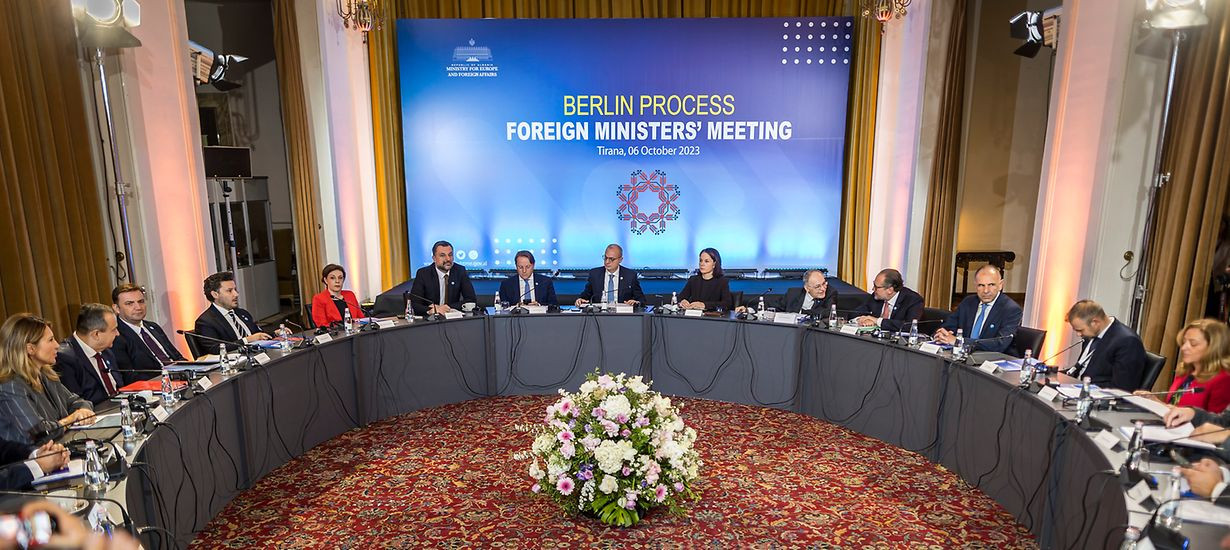
Photo: Thomas Koehler/AA/photothek.de
On October 6, 2023, German Foreign Minister Baerbock was attending the meeting of foreign ministers as part of the Berlin Process with the countries of the Western Balkans, which was held in Tirana.
Read on to see Minister Baerbock's statement prior to departing to the meeting, and to find out about the aims of the conference and why it is even more important this year:
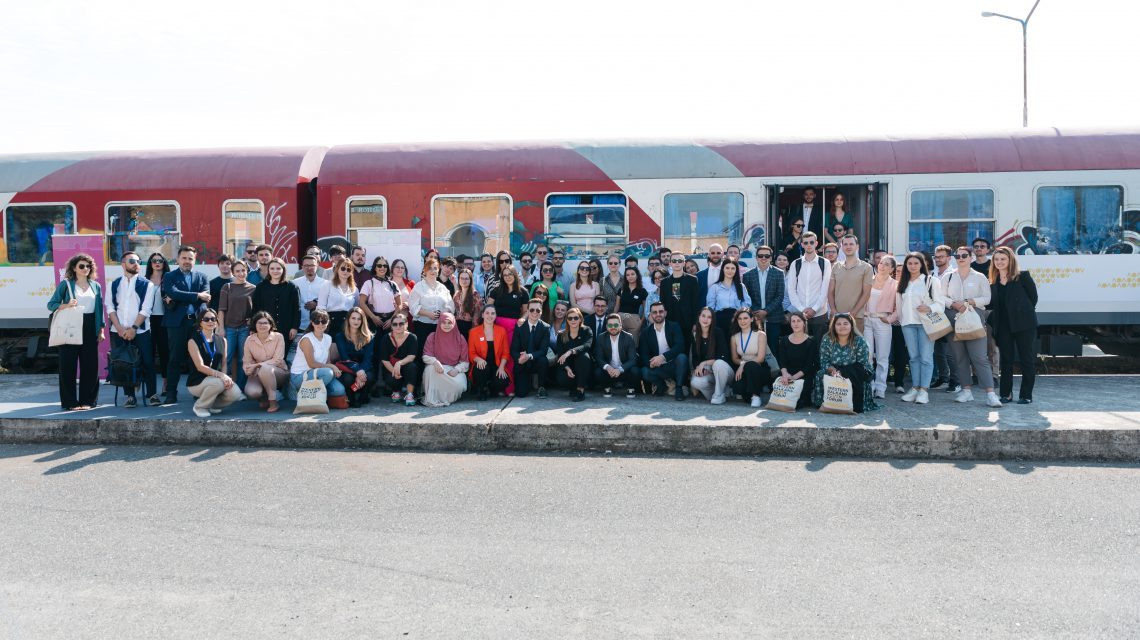
Photo: RYCO
The Western Balkans Youth Forum 2023 took place in Tirana, Albania, serving as a significant convergence point for young voices in the region. With the support of the Albanian and German governments and the co-organization by the Regional Youth Cooperation Office RYCO (www.rycowb.org), the event saw 36 young representatives joining forces to call upon various stakeholders and decision-makers. They were central in reflecting on and advancing action points, aligning with the three core pillars of the Berlin Declaration: Resilient Democracies, Inclusive Peace and Security, and Sustainable Future.
With the theme “Balkan Youth Express,” the forum blossomed into a diverse gathering of over 90 participants, not only youth but also ministers, local and regional stakeholders, and institutional representatives. This collective sought to track the developments arising from the 2022 Berlin Declaration and lay down foundational pillars for the upcoming year, transforming theoretical aspirations into tangible actions and activities. It also created a space for high-level dialogues involving Western Balkans and EU actors.
In the broader context, the forum is a vital element of the Berlin Process, aiming at fostering regional integration and enhancing connections with the EU. RYCO has emerged as a pivotal institutional mechanism within this initiative, dedicated to connecting and empowering the Western Balkans' youth. Looking ahead, the upcoming 2023 Berlin Process Summit in Tirana promises to highlight not only the region’s commitment to integration but also its dedication to empowering the youth and solidifying collaboration among various decision-makers and stakeholders.
In essence, the forum embodies a dedication to propelling a brighter future, addressing the challenges of today while gearing up for the opportunities and potentials of tomorrow. The collective efforts of young representatives, supported by ministers, local and regional stakeholders, and institutional representatives, emphasize a future where youth are not just seen but are also heard and involved in shaping the course of the region’s development. Each discussion, each formulated action point, is a testament to the vigor and commitment that defines the Western Balkans’ young generation, ready and equipped to lead into a future of Resilient Democracies, Inclusive Peace and Security, and a Sustainable Future.The venue, the Center for Openness and Dialogue in Tirana, buzzed with energy and anticipation. Participants embarked on a symbolic train journey from Elbasan to Durres, a setting that allowed for in-depth discussions focusing on the critical areas outlined in the Berlin Declaration. The youth, taking center stage, engaged in shaping comprehensive action plans that were later presented to local stakeholders at the concluding event at the Piramida Center.
You may find the Conclusions of the Youth Forum below, as well as more information on RYCO's website: WB Youth Forum 2023 in Tirana: Empowering Youth to Act on Berlin Declaration – Regional Youth Cooperation Office (rycowb.org)
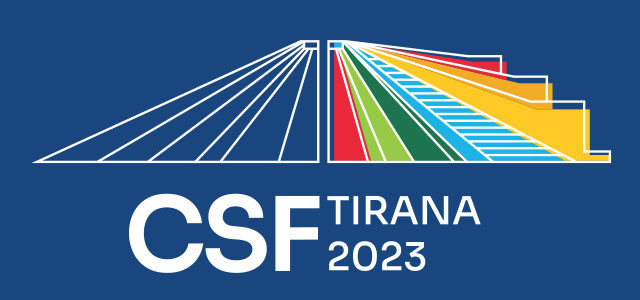
The Civil Society Forum took place October 14-15 in Tirana. Below you may find the Recommendations for your download.
On the CSF website https://wb-csf.eu/publications-csf you may find for your download Detailed Recommendations of the Thematic Working Groups on:
- Access to European Single Market;
- climate and Green Agenda;
- Digitalization and Connectivity;
- Energy;
- Mobility;
- Politics of Enlargement; and
- Security and Geopolitics.
